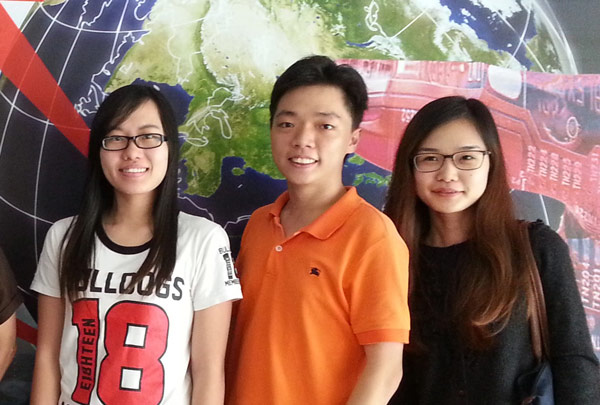KUCHING – A proposal for a low cost, crowdsourced, GPS-equipped robotic buoy that could monitor water pollution won fourth place in the IBM Students for a Smarter Planet/IEEE Smarter Planet Challenge: Student Projects Changing the World competition.
“Project Lily”, submitted by three engineering students from Swinburne University of Technology Sarawak Campus, was submitted by Ivan Ling Ting Yang, Kong Kah Hung and Doreen Yong Poh Ling.
They were awarded prize money of US$2000 (about RM7100) for coming in fourth. There were 60 submissions from 21 countries in the competition and only the top five are awarded prizes.
“We were inspired by crowd funding websites where start-up businesses gathered financial resources from public donations. We decided to crowdsource data on water quality based on this idea. This way, real time data can be collected and awareness about pollution can be created simultaneously,” he said.
“A network of secondary school students will be set up for crowdsourcing,” said Ling, adding that they will be provided with the schematics to build the simple device.
The data obtained will be processed and stored in Cloud servers and released to the public through the Project Lily website so that they too can contribute positively to the environment.
Powered by an on-board battery and solar panel, the robotic buoy uses recycled plastic bottles put together to resemble a water lily as its floatation device. It is fitted with environmental sensors and a GPS to collect data.
The team proposed to first start the project in Kuching before expanding it to the rest of the country and the world.
A short video on the project is available on https://www.youtube.com/watch?v=9pVp9N7fNdY
This is the second time Swinburne Sarawak has won a prize in the annual competition. In 2013, a proposal for a solar energy tower by its students won fourth place.
A letter from IBM Program Co-chair Wendy Murphy, and the Institute of Electrical and Electronics Engineers (EEE) Past President and Program Co-Chair Dr Arthur Winston commended the trio and expressed interest to implement the project.
“Your project received high marks in all of the evaluation criteria and reflects well on the professional skills of you and your teammates,” it said.
“Through your efforts, future students will have the opportunity to experience the challenge of applying their knowledge and skills in order to solve a problem that betters humanity.”
University College Cork (UK) won first place in the competition while Boston University and Massachusetts Institute of Technology (US) was second. In third was Delft University of Technology (the Netherlands) and fifth was Sun-Yat Sen University and South China University of Technology (China).
The Smarter Planet Challenge invites creative team-based student projects that could help them learn about applying engineering, science and other disciplines to solve real world problems.


